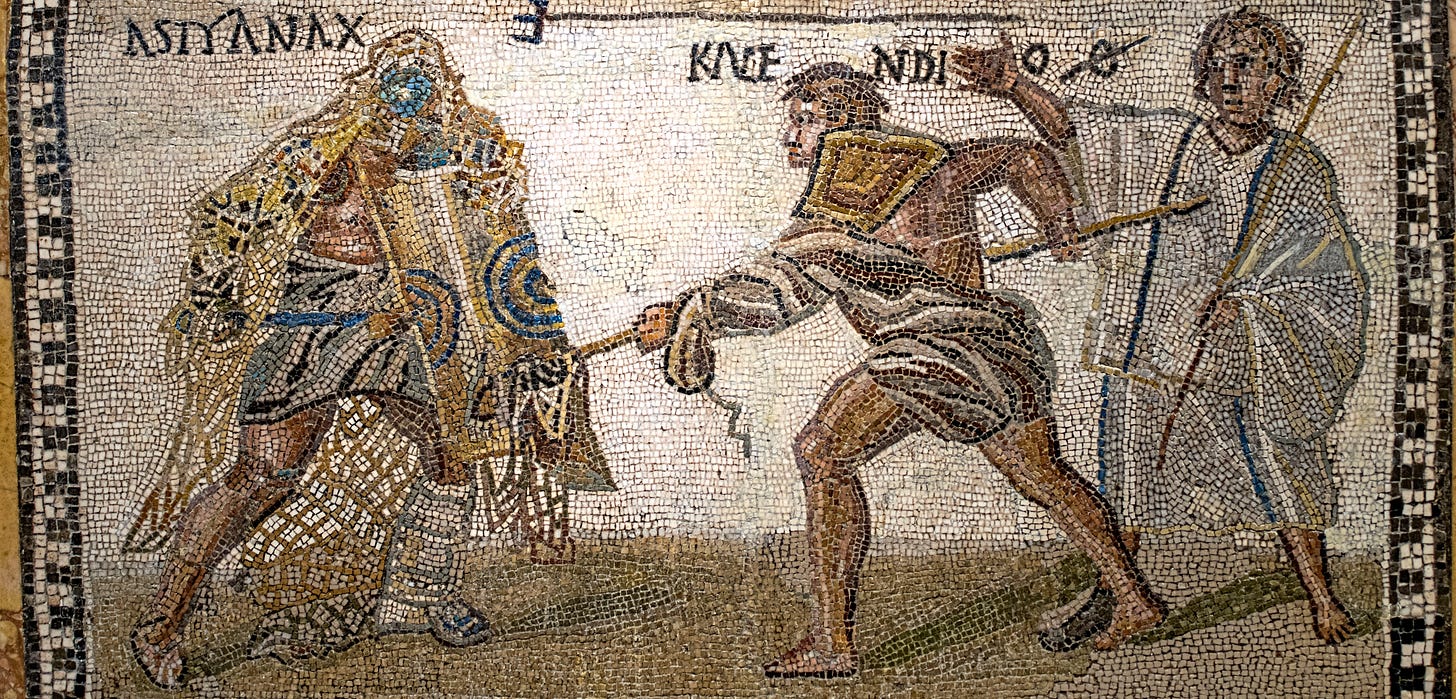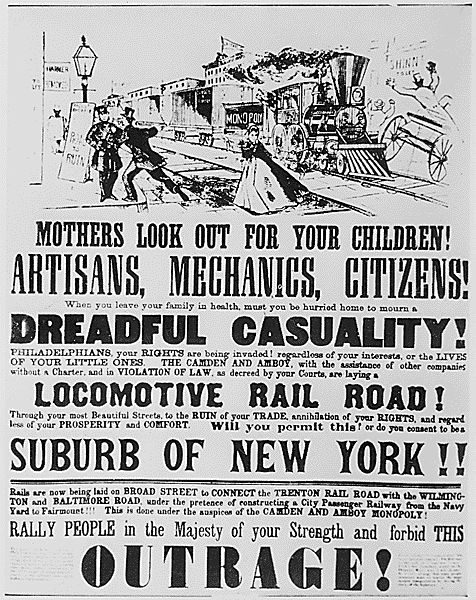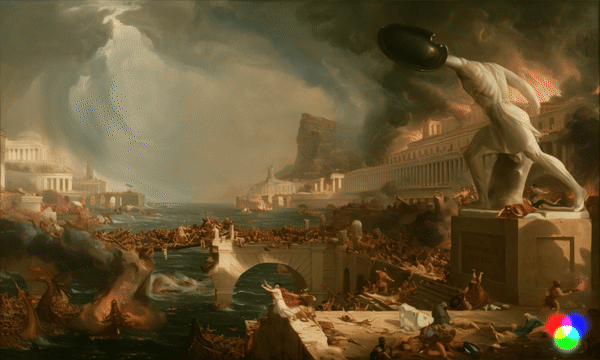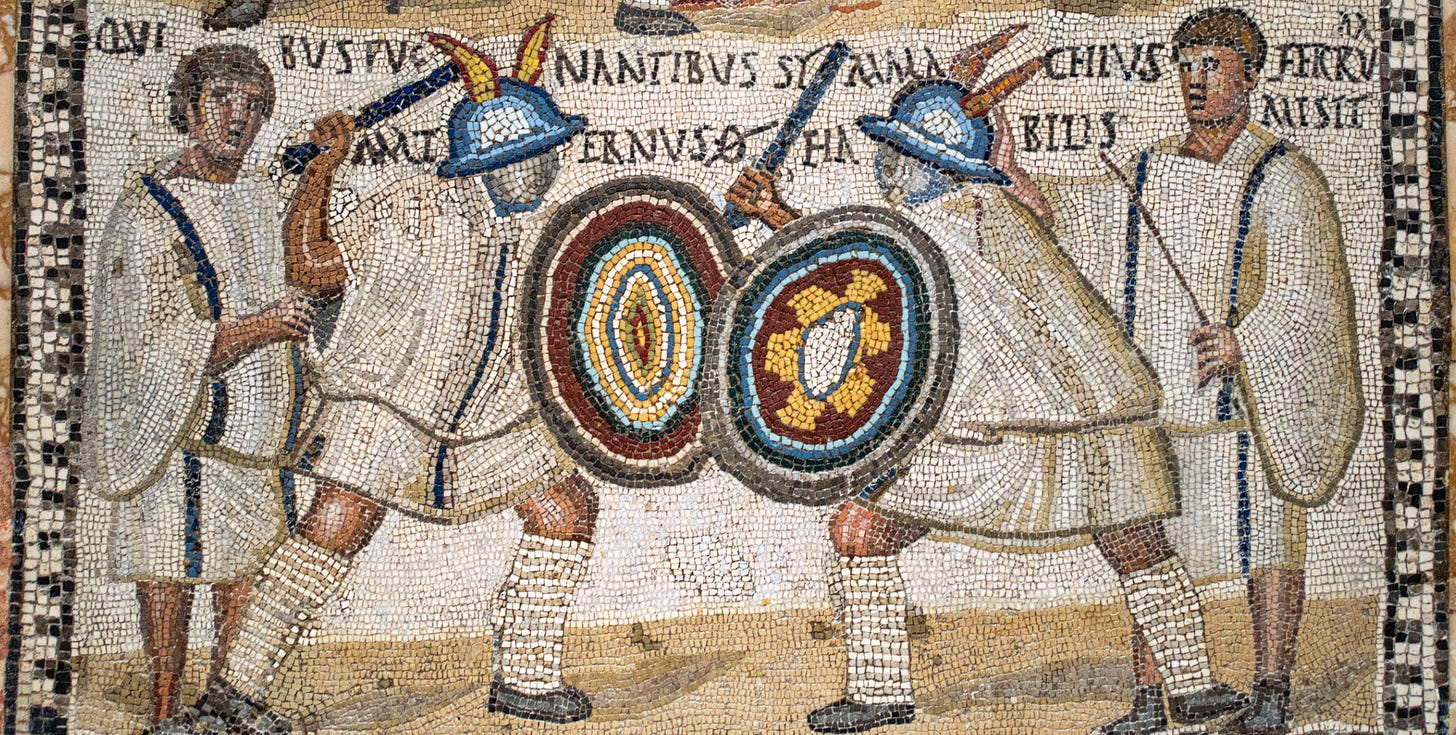[A spacious indoor arena. A wrestling ring is in the middle, surrounded on three sides by a large crowd. There is an elevated platform on the fourth side. Above it is a large screen. The screen displays a rotation of ads for Manifold, the Long Now Foundation, and Clarkesworld Magazine. The music is loud and somehow sounds like both electronic techno and Gregorian chant. The MC appears on the platform just as the ads on the screen are replaced by the details of tonight’s event. He speaks into a small headset microphone.]
MC: Welcome, welcome, ladies and gentlemen and all the rest, to this great final showdown of the League of Future Visions! Tonight, two clever, two ambitious, two ferocious contestants are here for us, ready to put up the fight of their lives for the hotly disputed title of Superpredictive Champion!
[The crowd cheers.]
MC: He has traveled a long way, and a long time, to be here tonight. He has defeated many foes on his path; many of you will remember the memorable victory he snatched from his strongest foe yet, Mathematical Modeling, in the semifinals — right after an impressive streak of wins against the likes of Augury and The Hunch. His signature move, Historical Analogy, has dazzled us time and time again, destroying the strategies of his adversaries with surgically precise debunking. He is The Data of the World, he is The Living Memory, he is… HISTORYYYYY!
[History enters the arena. He is relatively old, but strong-looking. He is wearing a fake golden armor made of accessories from various historical periods including Ancient Sparta, Song dynasty China, Napoleonic France, and WWI Germany. He waves. The crowd cheers.]
MC: But no adversary is more formidable than the one who will stand before him tonight. He is younger, but don’t let that deceive you. His command of new technology, his understanding of social trends, and most of all his signature technique, Narrative Extrapolation, have allowed him to easily defeat challengers such as Religious Revelation, Premonitory Dream, and The Astrologer. You might remember how, not long ago, no one thought he would rise so far; yet here he is, his prophecies coming true at an uncanny rate. He has many nicknames: The Anticipator, Asimov’s Revenge, and Singer of Space Opera, but nowadays everyone calls him… SCIEEEEEEENCE FICTIONNNNNNNN!
[Science Fiction enters the arena. He looks youthful and nerdy. He is wearing a full-body purple tracksuit and a high-tech mask with VR goggles. He waves. The crowd cheers. He stares at History menacingly. History makes a defiant gesture. Science Fiction raises his arms, and the crowd erupts into further cheering.]
MC: Ladies and gentlemen, people of all genders and creeds and colors, tonight we finally settle the score: Who of History or Science Fiction is the best at predicting the future? Let the fiiiiiight begiiiiiiiin!
[History and Science Fiction both descend into the ring. They circle one another cautiously. History speaks first. He has a crisp mid-Atlantic accent.]
History: Alright, Science Fiction. Bring it on. What is it gonna be this time? Another of your wildly implausible technological scenarios? Time travel? Faster-than-light interstellar communication?
[Science Fiction grins. Then he speaks, with a strong California valley accent.]
Science Fiction: History, I am so glad you asked. To keep things current, I was going to suggest that we play around the theme of—
[He pauses dramatically.]
Science Fiction: Will AI destroy the world??
[On the large screen we see a montage of AI catastrophic scenes from popular science fiction movies, including Terminator and something or other involving Johnny Depp. Then the words WILL AI DESTROY THE WORLD?? appear in bright red. History turns to the crowd and makes an exaggeratedly exasperated face.]
History: Oh God not this again.
Science Fiction: You see, dear adversary, I was thinking: this is a pretty tricky question for you, isn’t it? There’s never been anything like advanced AI in the past, obviously. So I was wondering if you’d acknowledge, if grudgingly, the need for an approach that tries to imagine the future rather than rely on tired, dusty analogies. Surely you’re not going to argue that AI can’t destroy the world simply because it has never done so?
[History scoffs. He climbs on the side of the ring and settles comfortably on a corner.]
History: You think your shiny new technology is totally unprecedented, eh? Of course you do. That’s the problem with you, Sci Fi — I hope you don’t mind me calling you Sci Fi? You’re just… not really aware of anything that actually happened in the past. So you make the same mistakes again and again.
Science Fiction: Pray tell, dear History: what mistake am I making, exactly?
[History makes a faint smile. He jumps down from the ring corner and starts talking in a manner not dissimilar to a professor giving a lecture.]
History: Well, let’s see. You seem to think that artificial intelligence is going to cause some sort of unspecified doom. I would like to remind our wonderful audience of all the previous occurrences of people predicting doom that, as you and I and everyone else may observe with our own eyes, never happened. In the 19th century, when the railroad was invented, people thought it would ruin society—
[As History talks, the screen changes to show a bunch of 19th-century anti-railroad propaganda posters like this one:
Science Fiction, however, rolls his eyes. He then interrupts his opponent.]
Science Fiction: Okay. Tired, dusty analogies it is.
[The crowds laughs sparsely.]
History: Well, if you’d let me finish—
[Science Fiction slams into History, pinning him to the ground. He punches him repeatedly with his arguments.]
Science Fiction: I certainly won’t! I won’t let you perform your signature move, not because I’m afraid of it, but because I couldn’t bear seeing someone so smart as you make such a bad argument! Like, come on, History, you know that Historical Analogies have only a limited predictive value. Unprecedented things happen all the time! Even in your train example, it didn’t destroy society like some of the most pessimistic people claimed—but it did revolutionize the way people traveled and moved goods around. There weren’t any science fiction stories in a modern sense at the time, but an author who predicted the world would vastly change thanks to nascent railroad technology would have been totally correct!
History: And yet—
[History manages to wrestle himself out of Science Fiction’s control. He escapes to the far corner of the ring, where he catches his breath.]
History: —somehow the changes are never doom.
Science Fiction: Correction: they’re never doom at the global scale, but that’s just because of the anthropic bias.
History: What’s that? Another of your fantasy technobabble concepts?
[Science Fiction presses a button on his VR helmet. The concept of anthropic bias is immediately info-dumped into the brain of History and everyone else in the arena. It means that we’re biased towards observing states of the world in which humans can exist and observe things, since other states are by definition non-observable. But the fact that we don’t observe them doesn’t mean they cannot happen.]
History: What does that have to do with anything? Also, please don’t upload things directly into people’s brains, it feels… violating.
Science Fiction: I don’t see how that’s different from regular langage, but whatever. What I mean is that we can’t rely on the fact that global doom hasn’t happened to predict it never will. If it had happened, we wouldn’t be here to talk about it. So we’re biased towards ignoring the possibility of doom.
History: Either that, or the data show that doom just isn’t likely.
Science Fiction: But that’s my point—if we relax the assumption that doom must be global, we see plenty of examples of doom! You’re the History guy, so I hardly need to make a list of historical societal collapses that have happened. But for the benefit of our esteemed audience—
[Science Fiction jumps onto the side of the ring. He presses more buttons on his goggles. The big screen starts showing animated scenes of societies undergoing violent upheavals. Easter Island. The classical Mayas. Some old Chinese dynasty. The Western Roman Empire. The Norse colonies in Greenland. Another old Chinese dynasty. The entire Eastern Mediterranean area during the Bronze Age. Yet another old Chinese dynasty. A cringe nonsensical AI-animated version of Thomas Cole’s The Course of Empire — Destruction painting.]
Science Fiction: See, it doesn’t take much to extrapolate into a realistic technology scenario. The Easter Islanders invent some new kind of statue construction technique, chiefdoms compete to erect the nicest statues, they cut down all the trees, soil erosion increases, and what little agriculture they have is ruined. Soon their relatively complex society collapses into a bunch of warring clans. We, with our modern, global civilization, invent some new AI technology; companies compete to make it as good as possible, and then some catastrophic effect comes out of it and wipes out a lot of what we care about.
[History, on the opposite end of the ring, shakes his head. He smiles condescendingly. Then he takes out a sword and waves it as he speaks.]
History: All these fancy examples and yet you fail to even make a single convincing point. Listen, Sci Fi, I totally accept, on the basis of this rich historical record of which you display a superficial understanding, that crises and upheavals happen. Unlike some optimistic liberals, I don’t think we’re anywhere near the “end of history.” There’ll be more disturbances, and sure, some of them will be caused by AI. Yet none of this supports any sort of final doomsday scenario. Indeed none of the civilizations in your examples have totally vanished; all have eventually rebounded at least partially. If local collapses cannot even make a culture disappear, it’s exceedingly unlikely that a crisis will cause the extinction of the entire human species.
[Having gotten nearer to Science Fiction, he slashes his sword at him. Science Fiction escapes narrowly by jumping back onto the ring. History chases him.]
Science Fiction: Again, anthropic bias! We don’t know about the cultures that totally vanished—
History: That’s too convenient an argument. I won’t allow you to make up any story you want and just say “but we just can’t know!” Yes, we can know quite a few things! That’s the whole point of studying history!
[Science Fiction, having outrun History thanks to his lack of a heavy armor, takes out his own weapon. It’s some sort of laser ray gun thing that seems to have been designed by the crew of the Star Wars prequel trilogy. They start duelling. Science Fiction shoots luminous projectiles that history blocks with his sword and armor.]
Science Fiction: Look, I agree that studying history is useful, I do it all the time myself—
History: As an amateur, clearly—
Science Fiction: —but you have to agree that it’s full of bias, and not just the anthropic kind. You’re biased towards things that are recent, for one thing. You’re biased toward explanations that were recorded in writing or within archeological artifacts. And you’re biased toward things from which you can build an interesting narrative.
[History adroitly deflects several of Science Fiction’s shots in a row.]
History: Wow! This is rich! YOU accuse me of being biased towards narratives?! You, the master of stories that extrapolate trends wildly in order to sell books and attract people into movie theaters?
[He lunges at Science Fiction, who blocks the sword hit by quickly activating a weird protective force field like in David Lynch’s 1984 movie Dune. But the force of the hit pushes Science Fiction to the ground.]
Science Fiction: Okay, fair point.
[History takes out a Roman gladiator’s net and throws it on Science Fiction. Science Fiction struggles to get out. History takes the opportunity to make a speech.]
History: Besides, you’ve forgotten one of the most important biases of all. One that you fall prey to time and time again, because of your need to tell entertaining stories. Your predictions, Sci Fi, are always simple. They have to be. Otherwise you couldn’t make them, and people couldn’t understand them. So the worlds you build, under the shiny patina of imaginary new technology, are essentially copies of our own, perhaps with very basic extrapolations of current trends. Even your wildest forays into the far future are the simplistic derivations from basic mathematical trends. And of course your favorite kind of prediction is the simplest of all: ruin, catastrophe, apocalypse — all of these are just visions a dead world, devoid of the beautiful complexity of humanity. You predict doom because doom is easy to imagine.
[Unbeknownst to History, Science Fiction has used a tiny laser tool to slice off enough strands of the net to get out. He waits for the right opportunity, then springs forward to body slam History.]
Science Fiction: Better to—
[History narrowly avoids Science Fiction’s attack. Science Fiction rebounds on the ropes at the end of the ring, and tries again. The crowd oohs and aahs.]
Science Fiction: —imagine—
[History crouches and lets Science Fiction pass over him. Science Fiction lands on the other side. He lunges towards History once more.]
Science Fiction: —simple scenarios—
[History stops him. They grapple in the style of Greco-Roman wrestling.]
Science Fiction: —than make the mistake … hgggh … of saying that … uuugghh … heavier-than-air flying is impossible … two months before the Wright brothers do it.
History: Hhhggrn … Some dumb guy predicted that. Savvy … historians know that sometimes … there are surprising innovations. Plus there were … hhgn … a lot of precursors of the Wright airplane. Which … you would … know if you actually studied history.
[They keep grappling. History seems to be gaining a slight advantage.]
Science Fiction: It was … uugggh … still a bad prediction borne out of the past.
History: You … make a lot of those too. Bad predictions, I mean.
Science Fiction: Yes! By design. We fiction writers readily admit that our predictions are more suggestive than accurate. You’re the one claiming some sort of foolish data-driven objectivity.
History: We don’t claim to be … perfect. But … we do the best we can. And since we know from our study of the past that sudden, unexpected change happens, we provide for this possibility whenever we speculate. … Which isn’t often. But sometimes.
Science Fiction: You ought to do a little more of that, I think, but then—
[He gets the upper hand and throws History to the ground.]
Science Fiction: —I understand you’d rather be caught dead than do anything resembling science fiction!
[History rolls to the side to avoid an attack by Science Fiction using what looks like a small lightsaber.]
History: Yeah, because at least I’m being epistemically humble. Unlike some who “use” history nonstop, but badly.
Science Fiction: Yep, we use history, and also our imagination! Much more efficient that way.
[History extends his legs and trips Science Fiction, who falls onto him. They remain in an awkward supine pose for a moment. Then a big crashing sound is heard from above. History, Science Fiction, the MC, and the audience look up. Another crashing sound.]
Science Fiction: What—
[The big screen changes to a chart with the caption “WHO WILL WIN TONIGHT’S LEAGUE OF FUTURE VISIONS FIGHT?” The chart consists of two histogram bars. One is golden yellow and labeled “History”. The other is bright purple and labelled “Science Fiction”. The two bars are almost equally sized, with Science Fiction’s being slightly larger. At its tip the number 51% can be read. At the tip of History’s bar: 49%. Then the chart refreshes and both bars become tied at 50%.]
MC: What is this?
[The screen refreshes again. Suddenly there’s a third bar to the histogram. It is lime green and labelled “The Superforecaster Sisters”. It immediately rises to 50%. The other two bars go down to 25% each. A murmur of excitement is felt among the audience. Science Fiction and History take the opportunity to get on their feet. They don’t immediately resume fighting.]
MC: Oh my. Oh my, ladies and gentlemen, it seems no one has “foreseen” it—but we are being visited by a new opponent for our contestants—none other than the SUPEEERFORECASTEEEEER SISTEEEERS!
[Yet another crashing sound from above. Then, helicopter sounds. From a hole in the ceiling, a rope ladder descends. On it are two women wearing superheroine costumes in two different shades of green. One of them, dressed in neon green, has a drone strapped to each of her arms. She jumps away from the ladder and begins flying around the arena using the drones. As she moves above the crowd, she drops small pieces of gold, purple, and green papers. The other woman wears an emerald costume. She remains on the ladder and speaks into a green megaphone.]
Superforecaster Sister 1: WE ARE THE SUPERFORECASTER SISTERS. TREMBLE, FOR WE ARE BETTER THAN ANY OF YOU. WE DO NOT LIMIT OURSELVES. WE INTEGRATE ALL SOURCES OF INFORMATION. HISTORY. SPECULATIVE FICTION. MATH. POPULAR OPINIONS. WE AVERAGE A SUCCESS RATE OF 55% ON BINARY PREDICTIONS, WHICH IS BETTER THAN RANDOM, AND BETTER THAN ANY OF YOU. TREMBLE.
[Superforecaster Sister 2 keeps dropping her little pieces of paper throughout the crowd.]
History: Okay but this is cheating.
Science Fiction: Yeah, I thought we were supposed to pick just one approach. Obviously if you can ensemble history, science fiction, and various other models then you’re going to do better.
[History addresses the MC.]
History: Hey, is this supposed to be happening?
[The MC shrugs.]
Superforecaster Sister 1: WE HAVE PICKED ONE APPROACH EACH. MY NAME IS EXPERT INTUITION. MY SISTER’S NAME IS WISDOM OF THE CROWD. WANT TO SAY A FEW WORDS, SISTER?
[Superforecaster Sister 2, a.k.a. Wisdom of the Crowds, flies by Expert Intuition and grabs the megaphone. She lowers herself to a corner of the ring. She speaks.]
Wisdom of the Crowds: HELLO. WHAT YOU SEE ON THE SCREEN IS A PREDICTION MARKET. IT IS UPDATED IN REAL TIME ACCORDING TO YOUR VOTES. PEOPLE, PICK ONE OF THE PAPERS I DISTRIBUTED, AND VOTE: WHO WILL WIN? GOLD FOR HISTORY? PURPLE FOR SCI FI? OR GREEN FOR THE SISTERS?
[The audience begins voting, overwhelmingly in favor of the sisters. The prediction market histogram gradually updates to 70% in favor of the sisters and 15% for the other two.]
History: I’m pretty sure she dropped way more green papers than gold or purple ones. This is definitely cheating.
Science Fiction: Also why are the two of them in a team? Isn’t this an individual competition? MC, can you do something?
MC: Uh, maybe?
[The MC speaks to someone on a private channel of his headset microphone. Then the gold and purple bars merge into a single striped gold-and-purple bar labeled “History-informed speculation.” Science Fiction looks at History.]
Science Fiction: Let’s do this?
[History nods.]
History: Let’s do this, Sci Fi.
[They take out their weapons, an early 20th-century Russian rifle and a version of Nikola Tesla’s death ray that seems to have been designed by Elon Musk. They charge to attack Wisdom of the Crowds. She lets out a shriek and jumps away from the ring.]
Wisdom of the Crowd: Friends among the audience, help me!
[Nobody in the audience moves. She climbs the arena’s staircases to run away. The rope ladder, meanwhile, has been lowered enough for Superforecaster Sister 1, a.k.a. Expert Intuition, to jump down and come to help her sister.
Expert Intuition: I’m coming, sister!
[Wisdom of the Crowd remembers she is holding a megaphone.]
Wisdom of the Crowd: FRIENDS AMONG THE AUDIENCE, HELP ME! PLEASE!
[History and Science Fiction catch up and attack her. About ten members of the audience come to her defense. Expert Intuition joins the fight. She is somehow accompanied by Francis Fukuyama, Dominic Cummings, and Philip Tetlock. Fukuyama disarms Science Fiction’s death ray. History’s old rifle proves unusable. A large and confusing melee begins.]
MC: Well! This is not, I’ll wager, what any of us expected! However, may I remind everyone that all of this is most definitely staged, and everyone involved is a professional. Please, uh, please don’t join the big melee fight.
[He pauses to listen to something in his headset.]
MC: Um, in fact, please leave the arena now. The staff will guide you to the nearest exit.
[Some spectators leave, but most remain to watch. The melee continues. On the screen, the prediction keeps changing, always remaining within 10 percentage points of 50-50 odds. Eventually a new bar appears. It is pale gray and labeled “Neither”. It begins at 1%, but gradually rises. The melee slows down. No one can see any of the four contestants. The spectators realize, one by one, they’re just fighting other random people, and stop. They look at each other with confusion. Dominic Cummings realizes he needs to be somewhere and leaves. Francis Fukuyama realizes he’s 71 and way too old for this. He sits down. Philip Tetlock takes out his phone to place a bet on the prediction market. The bar labeled “Neither” has reached 98%.]
MC: Well, ladies and gentlemen… it seems like tonight’s event has come to a conclusion. I’m afraid that no Superpredictive Champion shall be crowned tonight. A tie! Who could have seen it coming! But fear not—the League of Future Visions will be back next year, with an expanded lineup. Perhaps we shall see the Superforecaster Sisters again! Perhaps new opponents! Who knows? And If you think you do know, consider entering the competition! Alright, see you next year, and may all your good predictions come true! So long!
[The MC goes backstage. The screen goes back to its rotation of ads. New music begins playing—a mix of Baroque concertos and experimental jazz. The remainder of the audience slowly leaves. Staff come clean up the mess of the fight. History, Science Fiction, and the Superforecaster Sisters are still nowhere to be found.]







Brilliant!
Sur les sites de paries en ligne, un seul individu avait parié sur une incroyable neutralité et il a remporté 10 millards d’une monnaie virtuelle quelconque. Le crime organisé est après lui. Ils l’accusent de hacking et tricherie… Ils sont aussi peut-être à la recherche de leur nouveau poulin pour le prochain combat…